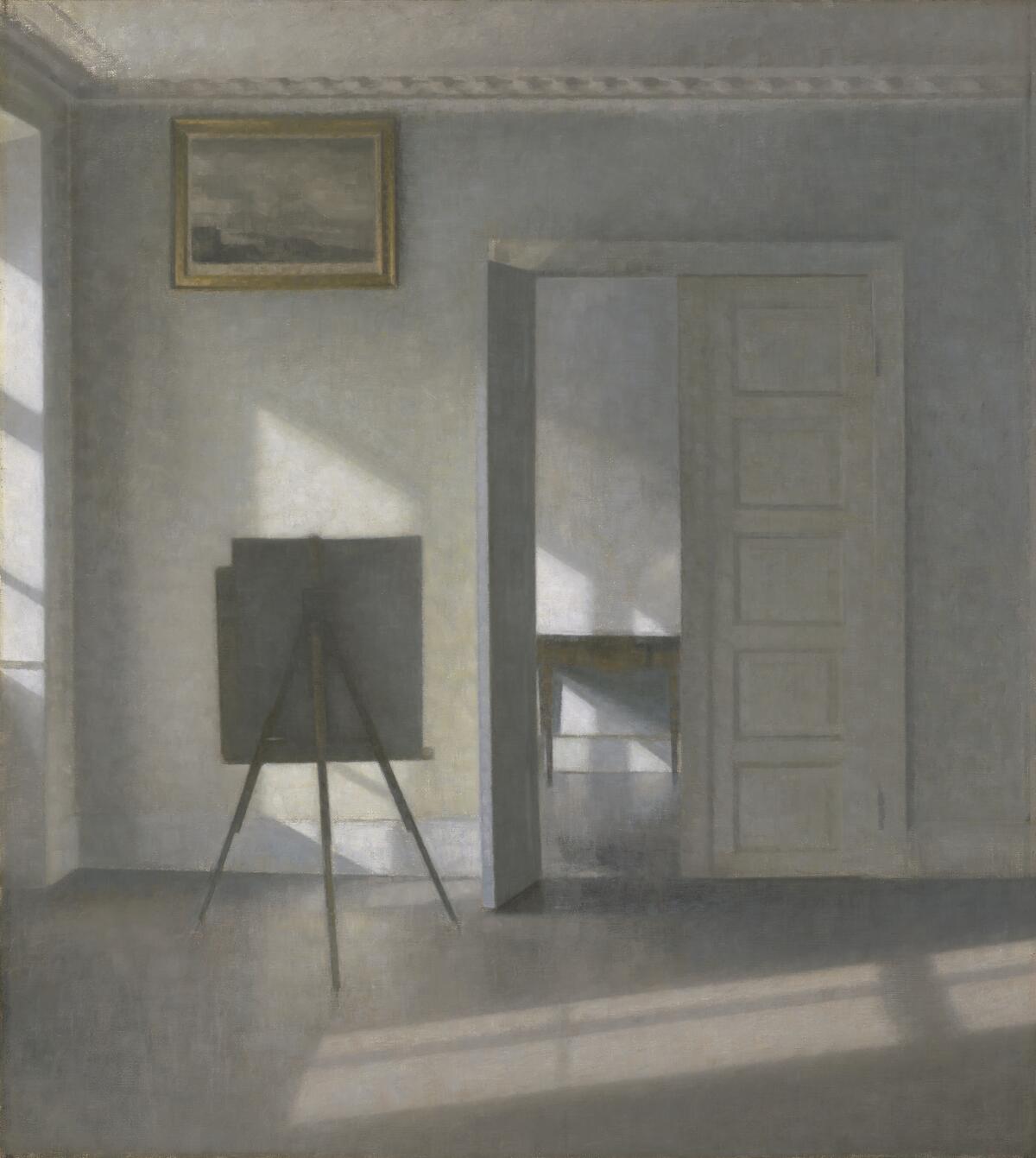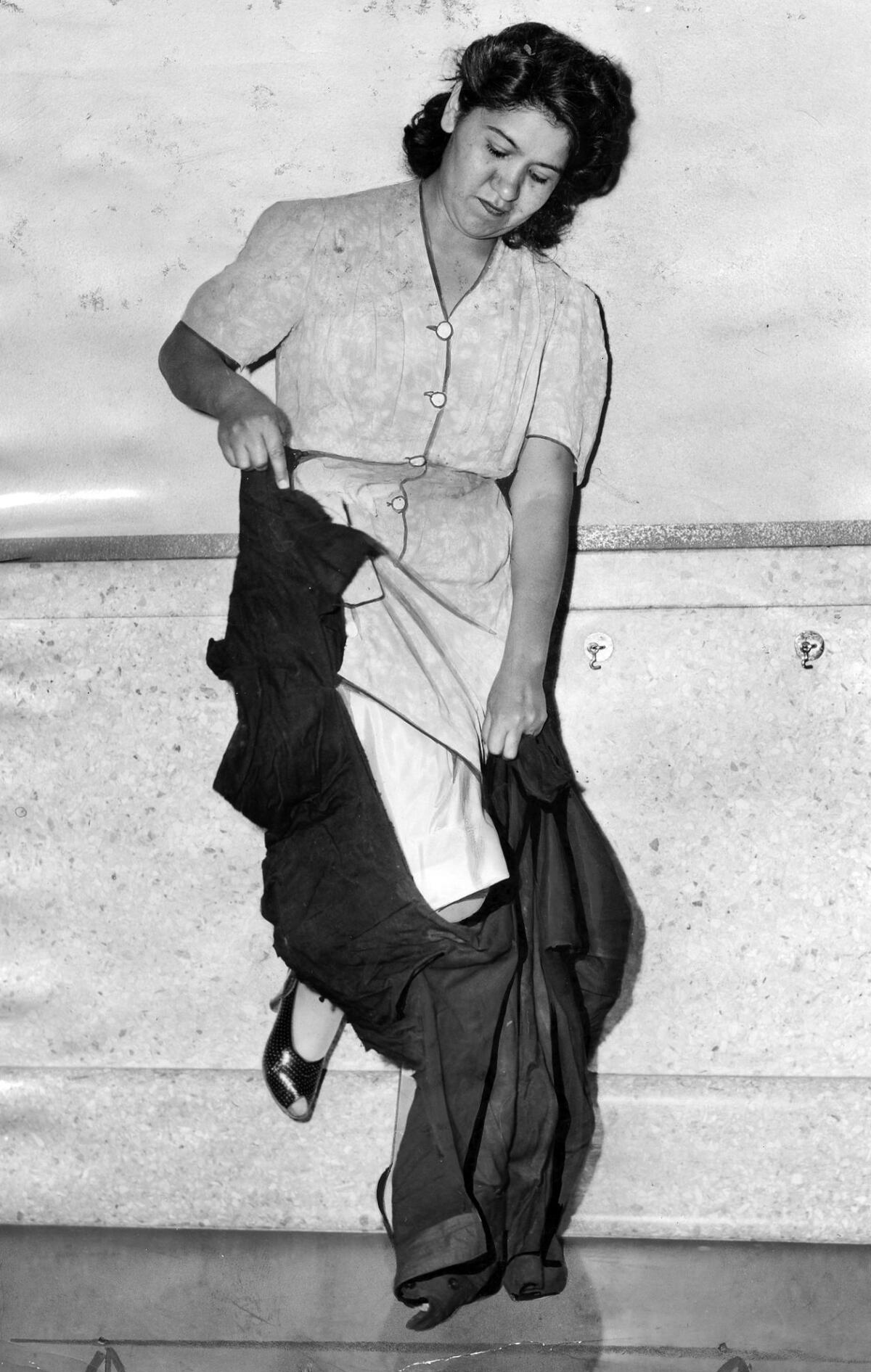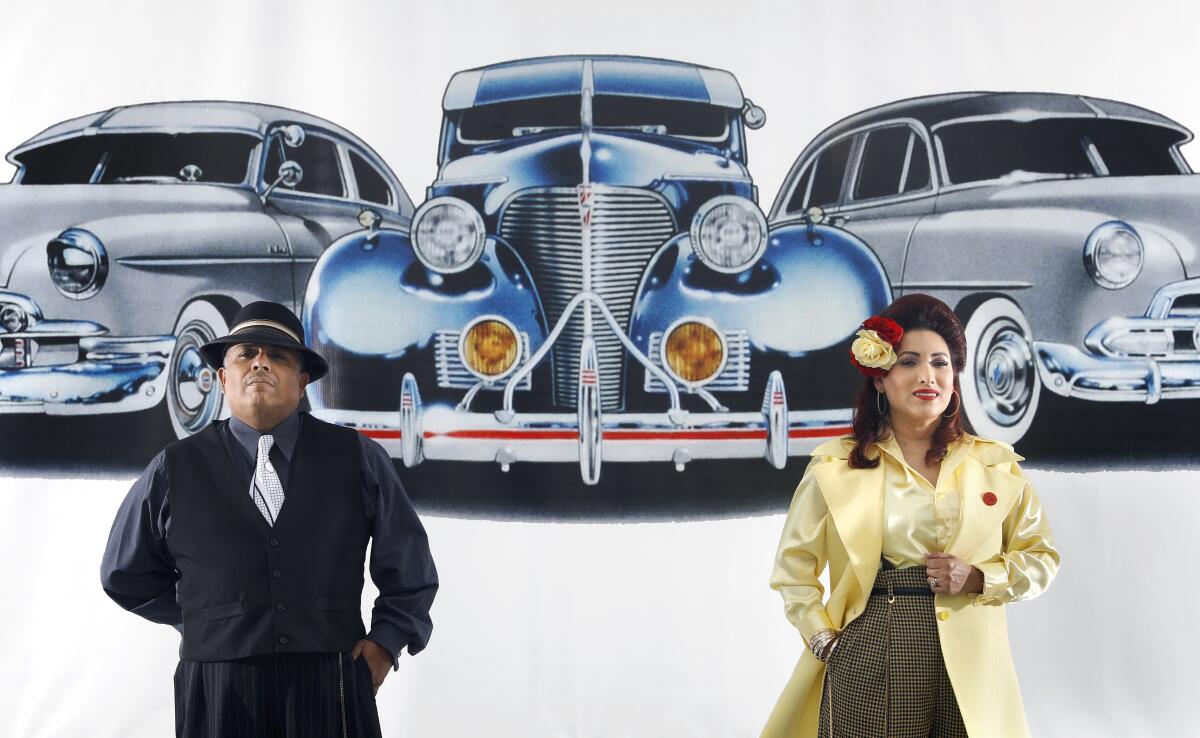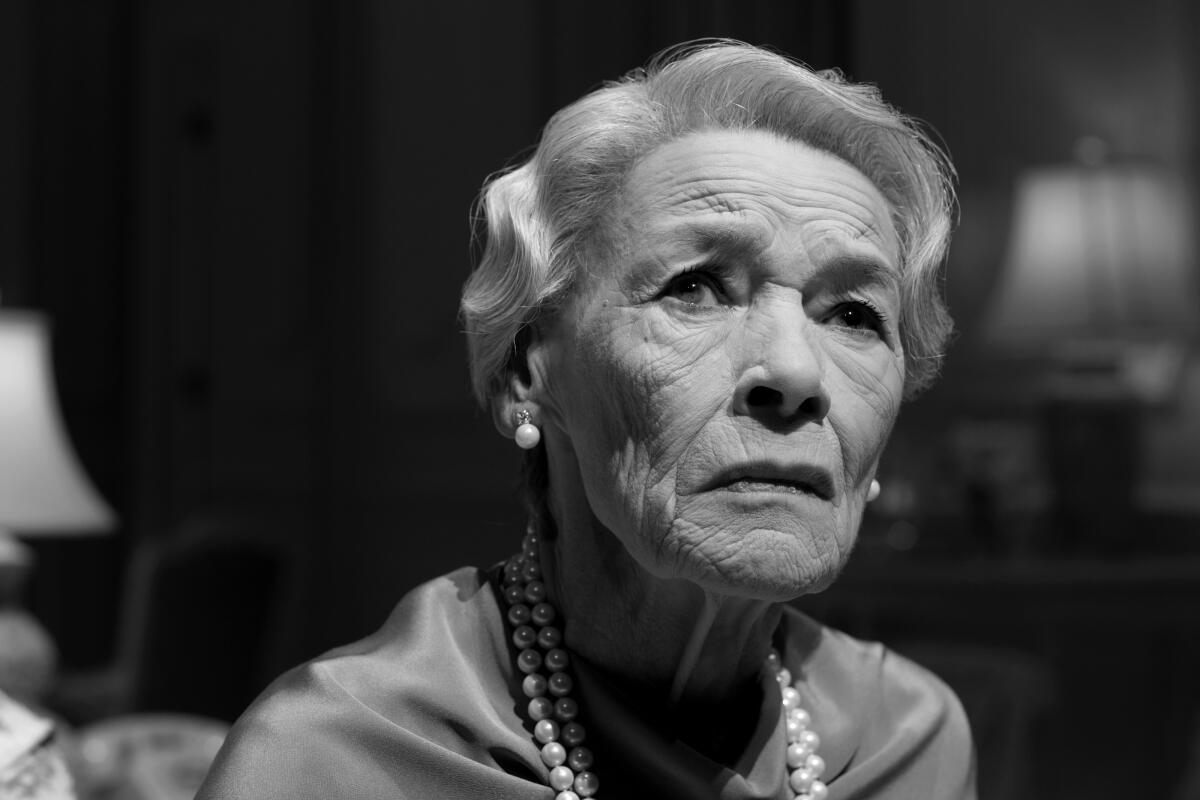From Tonys to layoffs at Center Theatre Group: Inside theater’s up and down week

- Share via
Welcome to the special coronavirus edition of the newsletter because I just tested positive. I’m Carolina A. Miranda, art and design columnist at the Los Angeles Times, and I’m here with some germs and the week’s essential arts news:
On and off the stage
The Tony Awards were on Sunday and naturally, trying to stream the whole show was a darn mess, with some of it broadcast on CBS, some on Paramount+ Premium and much of the pre-show on Pluto TV. The main broadcast, in fact, missed a key moment in which Jennifer Grey honored father Joel Grey with a lifetime achievement award and Joel belted out his famous opening lines from “Cabaret” to a roar of approval from the crowd. I would love to meet the TV programming geniuses who came up with this streaming plan.
Times theater critic Charles McNulty, however, reports that this very unusual Tony Awards — which remained unscripted in solidarity with the striking Writers Guild of America — was more meaningful because of it. “Capitalism undervalues the soul, which is the locus of writers’ activity,” he writes. “Ironically, the script-free ceremony, hosted by Ariana DeBose with sharp focus, was one of the most soulful Tony Awards in history, because there were no intermediaries brought in by the network to check off boxes that executives deemed necessary.”

The Times’ theater crew rounds up all the key moments, including groundbreaking wins for nonbinary actors and a record-setting award to Tom Stoppard. Plus, McNulty‘s ranking of the musical nominees from worst to best, and a complete list of nominees and winners.
Make the most of L.A.
Get our guide to events and happenings in the SoCal arts scene. In your inbox once a week.
You may occasionally receive promotional content from the Los Angeles Times.
The Center Theatre Group will lay off 10% of its full-time staff and pause programming at the Mark Taper Forum due to budget shortfalls. The first show to be affected is a play by Larissa FastHorse, who was going to be the first Native American writer to have a mainstage production at the Taper. “The Taper has long been CTG’s creative beating heart — a place where the company takes its biggest risks and enjoys its greatest artistic rewards,” writes The Times’ Jessica Gelt. “It is also the stage that can be the most financially draining, since many of the shows staged there do not enjoy the mainstream name recognition of the bigger shows that land at the larger Ahmanson Theatre.”
In the galleries
A number of years ago, the Getty acquired a strange and beautiful canvas by Danish painter Vilhelm Hammershøi. Times art critic Christopher Knight gets into the history of this mysterious work, which shows an empty room containing only light and a pair of canvases. “The work’s serene precision and contemplative subjectivity emerged during a period of epochal upheaval in Denmark,” he writes. “The exhibition productively frames this art as a visual exploration of what it means to be a nation in abject turmoil.”

On view for one more week, the exhibition “Entanglements: Louise Bonnet and Adam Silverman at Hollyhock House” introduces the work of a pair of contemporary artists into the home that Frank Lloyd Wright designed for Aline Barnsdall. “To have new art interpret the house harks back to Barnsdall’s desire that her home, which was originally envisioned to be part of a larger experimental arts colony, be an inspiration for art,” writes contributor Andrea Richards.
He has exhibited all over the world, tattooed A-list celebrities and designed a limited edition Nike sneaker. But until now, Mister Cartoon had not had a solo show in his hometown of Los Angeles. A new exhibition, which opens at Beyond the Streets and Control Gallery in Hollywood, will take care of that. On view will be paintings, graffiti-inspired drawings and a custom car. “It’s a huge moment,” he tells The Times’ Deborah Vankin. “I don’t take it for granted.”

Zoot suit!
“A suit lands in the United States on the back of an exiled king. It is copied, amended and upgraded, embraced by Hollywood actors in search of the fashionable. As it travels the country in the late 1930s, the coats grow longer, the pants more voluminous and the waists ever more cinched. It is adopted by bandleaders and jazz musicians who add bold ties in colorful prints.” On the 80th anniversary of the Zoot Suit Riots, I get into the design history of the highly politicized zoot suit — and how it continues to influence fashion.

My colleague Reed Johnson revisits Luis Valdez’s 1978 play “Zoot Suit,” which made a star of Edward James Olmos, drew attention to this historic episode and helped re-popularize the zoot suit as a living garment. “It was a monumental moment in time, and we captured lightning in a bottle,” says Olmos. “Not only did it change the course of Latinos in theater but it touched the very soul of the culture. It was catching the voice of the pachuco.”
Visit this link for The Times’ anniversary coverage of the Zoot Suit Riots — including this excellent column by Gustavo Arellano.

Scholar Catherine S. Ramirez, whom I interviewed for my story, has a great op-ed in the Washington Post that looks at how the anti-zoot suit sentiment of the ‘40s can be connected to the bans on drag shows today. “Like the Zoot Suit Riots, recent anti-drag measures attempt to police gender in public spaces,” she writes. “They, too, are driven by fears that transgressive dress signals malicious intent and that people who challenge gender norms with their attire are dangerous.”
Enjoying this newsletter? Consider subscribing to the Los Angeles Times
Your support helps us deliver the news that matters most. Become a subscriber.
Feeling the need to see some musical numbers featuring zoot suits? Here’s Perez Prado’s “Pachuco Bailarín” and Cab Calloway performing “Geechy Joe” in “Stormy Weather.” Fabuloso!
Passages
The inimitable British actor and politician Glenda Jackson has died at the age of 87. “Jackson had a voice that was a precision-guided weapon,” writes McNulty in an appreciation (that includes the story of their disastrous tea in 2018). “A raspy purr making bedroom promises one minute, it could turn fatally satiric the next. Once unleashed, the seething tone seemed to gather momentum. Jackson at her best was spurred on by grievance, the legitimate grievance of those who had been routinely underestimated because of gender or social class.”

Jacques Rozier, director of acclaimed French New Wave films such as “Adieu Philippine” and “Du Côté d’Orouët,” has died at 96.
George Winston, a Grammy-winning pianist known for mixing genres, as well as for composing the soundtrack for “This Is America, Charlie Brown,” is dead at 73.
In the news
— A pair of climate activists were convicted by a Vatican court for gluing themselves to the base of the Laocoön statue. So far, no one has been convicted for incinerating the sky.
— Jay-Z and Beyoncé have bought a $190 million house designed by Tadao Ando in Malibu.
— Tina Rivers Ryan has an interesting essay on LACMA’s “Coded” exhibition, about digital art and the early computer age.
— The history of Sacagawea gets a fascinating revision courtesy of the Mandan, Hidatsa and Arikara Nation. Basically, she may have lived a whole lot longer than historians had previously thought.
— A fascinating, poignant story about the pottery made by a pair of enslaved Black ceramicists.
— Photos of L.A.’s early 20th century alligator farm.
And last but not least ...
Everything you needed to know — and all you didn’t — about Trump’s bathroom chandelier.
The biggest entertainment stories
Get our big stories about Hollywood, film, television, music, arts, culture and more right in your inbox as soon as they publish.
You may occasionally receive promotional content from the Los Angeles Times.




